(!)NOTE : Windows 7 users won’t be able to use some latest features of eCatalog/WOS since Microsoft is ending support for Windows 7 on 14 Jan, 2020. Please upgrade your system for uninterrupted services.
Air Tube/Nylon Tube(Material: Nylon:Nylon (Polyamide))
Additionally, we offer tubes capable of supporting various fluids such as water, chemicals, and general hydraulic oil. Complementary products like tube cutters and replacement blades are also available. For top-quality products, we highly recommend trusted brands such as MISUMI, SMC, PISCO, and CHIYODA.
Take advantage of the convenience of FREE SHIPPING and NO MINIMUM ORDER on Air tubes and related products. Should you have any doubts or require assistance in choosing the right product, our experts are readily available to provide advice and guidance.
Brand |
|
|---|---|
| CAD |
|
| Days to Ship |
|
3 items
- Sort By
-
You can add up to 6 items per a category to the compare list.
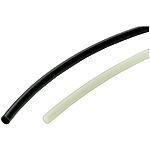
Tubes/Pressure Resistance Nylon
MISUMI
Tubes/Pressure Resistance Nylon
Nylon Tubes are used in various industries . They offer a wide variety of sizes to choose from.
[Feature]
● Outer Diameter (mm.) : 4, 6, 8, 10, 12 and 16
● Inner Diameter (mm.) : 2.5, 4, 6, 8, 9 and 12.8
● Length (m.) : 10, 20 and configurable between 0.5 to 19.5 m, and the minimum length can be increased by increments 0.5 m.
● Material : Nylon (Polyamide)
● Color : Black and White
[Application]
This Nylon Tube is used to connect with lubrication, hydraulic piping and so on.- Volume Discount
Outer Dia. D(Ø) Inner Dia. d(Ø) Material Applicable Fluid Color Type Operating Environment O.D. [Distinction] Cutting Service Usage Material: Nylon I.D. [Distinction] Material, Fluororesin Material, Urethane Number of Core(Core) Types of Related components 4 ~ 16 2.5 ~ 12.8 Nylon Air / Vacuum Black / White Straight - - Yes Nylon (Polyamide) - - - - - Days to Ship: Same day or more  Same day or more
Same day or more
-
You can add up to 6 items per a category to the compare list.
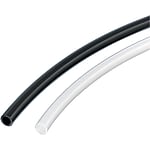
MISUMI
Tubes/Nylon
Air Tubes are used in various industries especially in penumatic system. They offer a wide variety of sizes to choose from.
[Feature]
● Outer Diameter (mm.) : 3.2, 4, 6, 8, 10 and 12
● Inner Diameter (mm.) : 2, 2.5, 4, 6, 7.5, and 9
● Length (m.) : 10, 20 and configurable between 0.5 to 19.5 m, and the minimum length can be increased by increments 0.5 m.
● Material : Nylon (Polyamide)
● Color : Black and White
[Application]
This Nylon Tube is used to connect with pneumatic equipments such as cylinders, fitting, directional control valve and so on.Outer Dia. D(Ø) Inner Dia. d(Ø) Material Applicable Fluid Color Type Operating Environment O.D. [Distinction] Cutting Service Usage Material: Nylon I.D. [Distinction] Material, Fluororesin Material, Urethane Number of Core(Core) Types of Related components 3.2 ~ 12 2 ~ 9 Nylon Air / Vacuum Black / White Straight - - Yes Nylon (Polyamide) - - - - - Days to Ship: 7 Day(s) or more  7 Day(s) or more
7 Day(s) or more
-
You can add up to 6 items per a category to the compare list.

NITTA
A highly resilient nylon coil tube S that does not elongate easily by losing elasticity.
[Features]
· A coil tube that is highly resilient and does not elongate easily by losing elasticity.
· The tubes have superior heat resistance.Outer Dia. D(Ø) Inner Dia. d(Ø) Material Applicable Fluid Color Type Operating Environment O.D. [Distinction] Cutting Service Usage Material: Nylon I.D. [Distinction] Material, Fluororesin Material, Urethane Number of Core(Core) Types of Related components 5.95 ~ 7.85 4.76 ~ 6.35 Nylon Air Orange Coil Standard ~6 ~ ~8 No Nylon (Polyamide) ~5 ~ ~7 - - 1 - From: ₹ 4,550.44 Days to Ship: 7 Day(s) or more  7 Day(s) or more
7 Day(s) or more
| Brand |
|---|
| Product Series |
| CAD |
| From |
| Days to Ship |
| Outer Dia. D(Ø) |
| Inner Dia. d(Ø) |
| Material |
| Applicable Fluid |
| Color |
| Type |
| Operating Environment |
| O.D. [Distinction] |
| Cutting Service Usage |
| Material: Nylon |
| I.D. [Distinction] |
| Material, Fluororesin |
| Material, Urethane |
| Number of Core(Core) |
| Types of Related components |
You can add up to 6 items per a category to the compare list. | You can add up to 6 items per a category to the compare list. | You can add up to 6 items per a category to the compare list. | |
| Brand | MISUMI | MISUMI | NITTA |
| Product Series | |||
| CAD |
|
| |
| From | ₹ 4,550.44 | ||
| Days to Ship | Same day or more | 7 Day(s) or more | 7 Day(s) or more |
| Outer Dia. D(Ø) | 4 ~ 16 | 3.2 ~ 12 | 5.95 ~ 7.85 |
| Inner Dia. d(Ø) | 2.5 ~ 12.8 | 2 ~ 9 | 4.76 ~ 6.35 |
| Material | Nylon | Nylon | Nylon |
| Applicable Fluid | Air / Vacuum | Air / Vacuum | Air |
| Color | Black / White | Black / White | Orange |
| Type | Straight | Straight | Coil |
| Operating Environment | - | - | Standard |
| O.D. [Distinction] | - | - | ~6 ~ ~8 |
| Cutting Service Usage | Yes | Yes | No |
| Material: Nylon | Nylon (Polyamide) | Nylon (Polyamide) | Nylon (Polyamide) |
| I.D. [Distinction] | - | - | ~5 ~ ~7 |
| Material, Fluororesin | - | - | - |
| Material, Urethane | - | - | - |
| Number of Core(Core) | - | - | 1 |
| Types of Related components | - | - | - |
Loading...
Configure
Specification/Dimensions
-
Outer Dia. D(Ø)
-
Inner Dia. d(Ø)
-
Material
- Urethane
- Nylon
- Fluororesin
- Polyamide
- Fluororubber
- Silicon Rubber
- Polyolefin Resin
- Others
- PVC
- Nylon/Fluoropolymer
-
Applicable Fluid
- Water
- Air
- Chemical
- General Hydraulic Oil
- Thermal Media Oil
- Vacuum
-
Color
- Black
- White
- Milky White
- Transparent (including non-white colors)
- Red
- Blue
- Yellow
- Green
- Orange
- Ocher
- Gray
- Multi Color
- Pink
- Others
- Purple
-
Type
-
Operating Environment
- Standard
- Clean Environment
- Corrosion Resistant
- Antistatic
- Sputtering Resistant
- Mold Cooling
- Water Resistance
- Pressure Resistance
- Vacuum
- Heat Resistance
- Abrasion Resistance
- Oil Resistance
- low temperature resistance
- Weather Resistance
- Chemical Resistance
-
O.D. [Distinction]
-
Cutting Service Usage
- Yes
- No
-
Material: Nylon
-
I.D. [Distinction]
-
Material, Fluororesin
-
Material, Urethane
-
Number of Core(Core)
-
Types of Related components
Related Categories to Air Tube/Nylon Tube
-
- Cylinders, Rotary Actuators
- Cylinder Connecting Components
- Filters, Regulators, Lubricators
- Solenoid Valves
- Electromagnetic Valves
- Pneumatic Pipe Fittings
- Speed Controllers
- Silencers
- Manual-Type Valves, Mechanical-Type Valves
- Air Tube/Nylon Tube
- Fluororesin Products for Chemicals
- Pressure, Flow Rate Sensors
- Dryers
- Compressors, Blowers
- Other Pneumatic Devices
-
FAQ Air Tube and Nylon Tube
- Question: What are air tubes made of?
- Answer: Common air tube materials include:
Silicone: flexible, long-lasting, and resistant to kinking. Often used in aquariums and for delicate applications.
Polyurethane (PU): tougher and more resistant to heat and chemicals than silicone. Frequently used in pneumatic systems and industrial settings.
Rubber: Affordable and widely available, but not as durable as other options. - Question: What are the applications of polyurethane tube?
- Answer: Polyurethane tubes are used in a wide range of applications across various industries. They find particular use in industries such as the automotive industry, robotics and automation, industrial machinery, and the food and beverage industry. In pneumatic systems, they are utilized to connect pneumatic equipment, including air fittings, air guns, directional control valves, and more. Additionally, polyurethane tubes serve multiple purposes, such as fluid transfer, vacuum systems, agricultural equipment, medical equipment, HVAC systems, and more.
- Question: What are the benefits of using polyurethane rubber hoses?
- Answer: The benefits of using polyurethane rubber hoses include:
1. Flexibility: Polyurethane hoses are highly flexible, making them easy to handle, install, and maneuver in tight spaces.
2. Durability: They are resistant to abrasion, impact, and tearing, resulting in longer service life and reduced maintenance costs.
3. Chemical Resistance: Polyurethane hoses exhibit good resistance to a wide range of chemicals, including oils, fuels, solvents, and many gases.
4. High Strength: Despite their flexibility, they have high tensile strength and can withstand high pressures without deformation.
5. Lightweight: Polyurethane hoses are lightweight, which improves handling and reduces the overall weight of the system.
6. Temperature Resistance: They can withstand a wide temperature range, enabling their use in both high-temperature and low-temperature applications.
7. UV Resistance: Many polyurethane hoses have good resistance to ultraviolet (UV) radiation, making them suitable for outdoor applications.
8. Versatility: Polyurethane hoses can be used in various industries and applications, including pneumatic systems, fluid transfer, vacuum systems, and more.
9. Reduced Noise: They have excellent noise-damping properties, reducing the noise level in pneumatic systems and improving workplace comfort. - Question: What are the difference between Polyurethane vs. traditional rubber hoses?
- Answer: 1. Material: Polyurethane hoses are made from thermoplastic polyurethane (TPU), while traditional rubber hoses are made from natural or synthetic rubber.
2. Flexibility: Polyurethane hoses are more flexible and can be bent without kinking, while traditional rubber hoses are less flexible.
3. Abrasion Resistance: Polyurethane hoses have excellent abrasion resistance, while traditional rubber hoses are generally less resistant to abrasion.
4. Chemical Compatibility: Polyurethane hoses have better chemical resistance, while traditional rubber hoses may have limitations in certain chemical applications.
5. Temperature Range: Polyurethane hoses have a wider temperature range, while traditional rubber hoses may have limitations at extreme temperatures.
6. Weight: Polyurethane hoses are lighter in weight compared to traditional rubber hoses.
7. Cost: traditional rubber hoses are typically more cost-effective than polyurethane hoses.
Remember that specific properties can vary based on manufacturer and application, so it's always a good idea to consult product specifications for accurate information. - Question: How to choose the right polyurethane hose for your application?
- Answer: Here are some factors to consider when choosing the right polyurethane tube for your application:
1. Pressure rating: The pressure rating of the tube must be higher than the pressure of the fluid or gas that will be flowing through it.
2. Temperature range: The tube must be able to withstand the temperature of the fluid or gas that will be flowing through it.
3. Chemical resistance: The tube must be resistant to the chemicals that will be flowing through it.
4. Flexibility: The tube must be flexible enough to accommodate the bends and curves in your application.
5. Tensile strength: The tube must be strong enough to withstand the forces that will be exerted on it.
6. Weight: The weight of the tube is important if you need to move it around or install it in a difficult location.
7. Cost: The cost of the tube is an important factor to consider, especially if you need a large quantity of it.
1. Pressure rating: The pressure rating of the tube must be higher than the pressure of the fluid or gas that will be flowing through it.
2. Temperature range: The tube must be able to withstand the temperature of the fluid or gas that will be flowing through it.
3. Chemical resistance: The tube must be resistant to the chemicals that will be flowing through it.
4. Flexibility: The tube must be flexible enough to accommodate the bends and curves in your application.
5. Tensile strength: The tube must be strong enough to withstand the forces that will be exerted on it.
6. Weight: The weight of the tube is important if you need to move it around or install it in a difficult location.
7. Cost: The cost of the tube is an important factor to consider, especially if you need a large quantity of it.



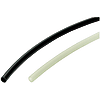
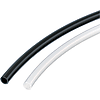



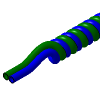


How can we improve?
How can we improve?
Thank you for your time.
Your feedback is essential for our continuous improvement
Privacy Policy
Thank you for your cooperation.
Thank you for your time.
Your feedback is essential for our continuous improvement
Please use the inquiry form.
Privacy Policy